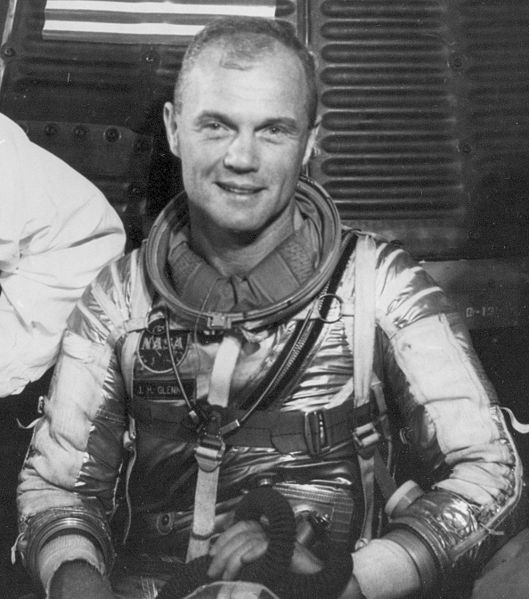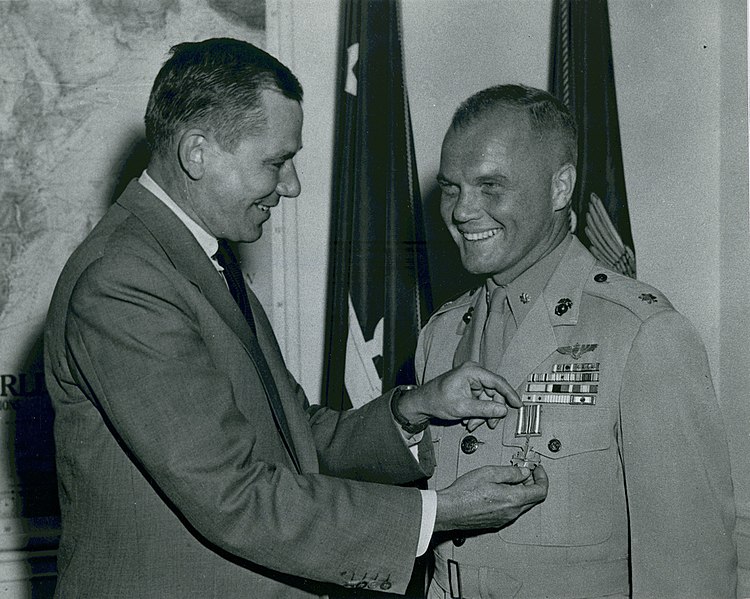John Glenn, born on July 18, 1921, in Cambridge, Ohio, was a distinguished American astronaut, military pilot, senator, and influential advocate for space exploration.
His remarkable career encompassed groundbreaking space missions, a successful political career, and a lasting commitment to advancing scientific research.
Here, we will explore key aspects of his life and contributions.
John Glenn Facts
1. Born on July 18, 1921, in Cambridge, Ohio
ohn Herschel Glenn Jr. was born on July 18, 1921, in Cambridge, Ohio, USA. He grew up in New Concord, Ohio, where he attended New Concord High School.
His interest in flying began at an early age, as he often watched airplanes flying over his hometown, sparking his passion for aviation.

2. Served in the U.S. Marine Corps during World War II and the Korean War
Glenn’s military career was marked by dedication and bravery. He joined the U.S. Marine Corps in 1942 and served as a fighter pilot during World War II. He flew 59 combat missions in the Pacific theater, earning the Distinguished Flying Cross for his valor.
During the Korean War, Glenn flew an additional 90 combat missions, establishing himself as a skilled and fearless pilot.
3. Became a test pilot for NACA and NASA
After his wartime service, Glenn continued to pursue his love for aviation by becoming a test pilot. He worked as a test pilot for the Navy, where he tested various aircraft and contributed to the development of new aviation technologies.
Also Read: Neil Armstrong Accomplishments
Later, he joined the National Advisory Committee for Aeronautics (NACA), the precursor to NASA, as a test pilot. Glenn’s experience as a test pilot played a crucial role in his selection as one of the original Mercury 7 astronauts when NASA began its manned spaceflight program.
His expertise in flying cutting-edge aircraft made him a prime candidate for the challenging and groundbreaking missions that lay ahead in the early days of the space program.
4. First American to orbit the Earth on Friendship 7 in 1962
On February 20, 1962, John Glenn achieved a historic milestone by becoming the first American to orbit the Earth. He did this aboard the Mercury-Atlas 6 spacecraft named “Friendship 7.”
Also Read: Sally Ride Facts
Glenn’s mission involved three orbits around the Earth, lasting approximately 4 hours and 55 minutes. His journey was a significant achievement during the early years of space exploration, symbolizing America’s determination to compete with the Soviet Union in the Space Race.

5. One of the original Mercury 7 astronauts
John Glenn was one of the original seven astronauts selected for NASA’s Project Mercury. This group of astronauts, known as the “Mercury 7,” included Alan Shepard, Gus Grissom, and John Glenn, among others.
They were chosen for their exceptional piloting skills, physical fitness, and ability to withstand the rigors of space travel. Glenn’s participation in the Mercury program marked the beginning of his legacy as a pioneering American astronaut.
6. Flew in space again on the Space Shuttle Discovery in 1998
John Glenn’s second journey into space occurred on October 29, 1998, during the Space Shuttle Discovery’s STS-95 mission. At the age of 77, he made history once again by becoming the oldest person to travel in space.
Glenn’s presence on this mission not only provided valuable data on the effects of space travel on the elderly but also inspired people around the world with his determination and commitment to scientific research.
His return to space solidified his status as a space exploration icon and a symbol of enduring achievement.
7. Served as a U.S. Senator from Ohio
After retiring from NASA in 1964, John Glenn embarked on a successful career in politics. He ran as a Democrat and was elected to represent the state of Ohio in the United States Senate in 1974. Glenn served as a senator for four consecutive terms, from 1974 to 1999.
During his time in the Senate, he worked on various legislative initiatives, including those related to science, technology, and space exploration. His political career allowed him to continue advocating for space exploration and other important issues.

8. Ran for the Democratic nomination for President in 1984
In 1984, John Glenn made an ambitious bid for the Democratic nomination for President of the United States.
He ran a competitive campaign but ultimately fell short in the primaries, with Walter Mondale winning the nomination. Glenn’s presidential campaign showcased his leadership qualities and his commitment to public service, even though he didn’t secure the nomination.
9. Advocated for space exploration
Throughout his political career and beyond, John Glenn remained a staunch advocate for space exploration and scientific research. He used his position in the Senate to promote funding for NASA and other space-related programs.
Glenn’s unique perspective as a former astronaut and a senator allowed him to effectively communicate the importance of space exploration to the American people and their representatives.
10. Received numerous awards, including the Presidential Medal of Freedom and Congressional Gold Medal
John Glenn received numerous awards and honors during his lifetime in recognition of his contributions to space exploration and public service. Some of the most notable honors include:
- The Presidential Medal of Freedom: He was awarded the highest civilian honor in the United States by President Barack Obama in 2012.
- The Congressional Gold Medal: Glenn received this prestigious medal, along with the other original Mercury 7 astronauts, in 2011 for their pioneering achievements in space.
- The Congressional Space Medal of Honor: This medal was presented to Glenn by President Jimmy Carter in 1978, recognizing his exceptional contributions to space exploration.
John Glenn’s legacy is one of courage, service, and dedication to both space exploration and the betterment of his country. He remains an enduring symbol of American ingenuity and achievement.
